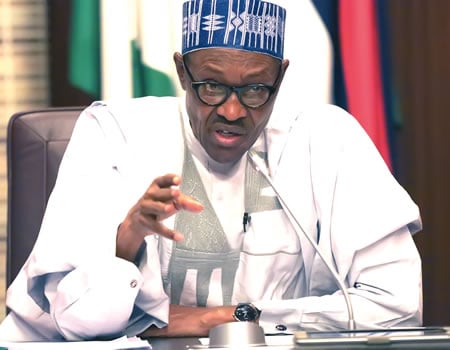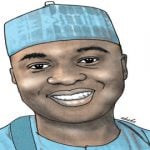
LEON USIGBE examines the enactment of Executive Order No. 6 by President Muhammadu Buhari and what it may mean for the opposition.
Last week, President Muhammadu Buhari signed an Executive Order No. 6 of 2018 on the “Preservation of Assets Connected with Serious Corruption and other Related Offences.” What it means is that if government suspects that someone has illegally acquired some assets and he/she is charged to court, government will take over the assets, albeit, temporarily pending when the judicial process runs its full course.
Moments after appending his signature to the document, Buhari rationalised it as another milestone in the fight against corruption, a project which he said is very crucial to the viability and continuous well-being of Nigeria. According to the president, from available records, the aggregate value of funds involved in some ongoing prosecution of high profile corruption related cases is over N595 billion. Going by the signed order, the money will remain frozen until such a time the courts dispose of the cases. Buhari’s argument seems to be that if such assets are not frozen, they can be used to perpetrate crimes against the country.
Hear him: “It is in consequence of this that I have decided to issue the Executive Order No. 6 of 2018 to inter alia restrict dealings in suspicious assets subject to investigation or inquiry bordering on corruption in order to preserve such assets from dissipation, and to deprive alleged criminals of the proceeds of their illicit activities which can otherwise be employed to allure, pervert and/or intimidate the investigative and judicial processes or for acts of terrorism, financing of terrorism, kidnapping, sponsorship of ethnic or religious violence, economic sabotage and cases of economic and financial crimes, including acts contributing to the economic adversity of the Federal Republic of Nigeria and against the overall interest of justice and the welfare of the Nigerian State.”
The president pointed out that the amount involved in the ongoing prosecution of corruption cases is far more than the 2018 budget of his administration’s Social Investment Programmme (SIP), meaning that if available to government, it can cater for home grown school feeding programme, government economic empowerment programme, N-Power Job Creation Programme, Conditional Cash Transfers, etc. Buhari argued that cumulatively, scores of millions of Nigerian citizens will benefit from these programmes. But observers believe that President Buhari took this position in the assumption that all the assets are mostly illegally acquired even before the courts have the opportunity to determine that.
The president is convinced though that while there are many reasons why Nigeria has been struggling, the most unfortunate cause of great disparity between Nigeria’s wealth and its poverty is endemic corruption. It is his belief too that there is a very strong link between corruption, peace and security. “Unfortunately, corruption is everywhere; at all levels of government, and every stratum of our society. Without doubt, corruption constitutes an unusual and extraordinary threat to the well-being, national security, and economy of Nigeria,” he regretted.
Conscious of this and his campaign promises to address the challenges of security, economy and corruption, President Buhari has been keen on enforcing the Treasury Single Account (TSA), strict implementation of the Bank Verification Number (BVN) Policy and had previously signed the Open Government Partnership, apart from other initiatives to build and develop the nation’s anti-corruption institutions.
To some people, the president sounded desperate when, during the signing ceremony, he lamented the humongous amount of work to be done with little resources available to government. He listed projects especially under the Ministry of Power, Works and Housing which has a budget of N344 billion in 2018, arguing that all the mentioned road projects require only the equivalent of about 57 per cent of the monies recovered by some of the on-going high profile corruption related cases to be implemented. However, analysts are of the view that it is the burning desire to have more funds available for his programmes that may be driving the president to adopt extreme measures which can also be targeted, in the main, at perceived opponents of government.
The main opposition party, the Peoples Democratic Party (PDP), certainly thinks that the president has gone beyond his bounds in enacting the order which it strongly condemned as illegal, unconstitutional, reprehensible and a dangerous step towards a descent to fascism. PDP believes that the order was imposed in total disregard to the provisions of the 1999 constitution. The party alerted soon after the president signed the order that the Nigerian constitution does not, under any section, “confer such fascist powers on the president under our democracy and there can be no legitimate latitude of interpretation placed on sections 5 and 15 (5) of the 1999 Constitution cited as justifications for this draconian executive order, that can excuse it.” Therefore, according to the PDP, “President Buhari’s unilateral Executive Order is a travesty of justice and rule of law, as it vehemently seeks to hijack and usurp the powers of both the legislature and the courts and vest it on himself so that he can use same at will, as a political instrument, to haunt, traumatise, harass and victimise perceived political opponents.”
The party therefore invited Nigerians and the international community to note what it argued is the deliberate attempt by the Buhari administration to side-step the provisions of the 1999 Constitution (as amended), usurp the powers of the legislature, the judiciary and impose an autocratic regime on the nation. It also charged the judiciary and the legislature to save the nation and her people from an imminent fascism by rejecting the obnoxious Executive Order. “Nigeria is a democratic state run by the dictates of the law and the constitution and not by the rule of the thumb of any elected officer.” PDP also informed that already, its lawyers are considering a legal action against the Federal Government on the illegality of the president’s action in the interest of Nigeria and Nigerians.
Despite the postulations of the former ruling party, analysts say Executive Orders whether issued by or on behalf of the president, have the force of law being a derivative of the Constitution and intended to direct or instruct the actions of executive agencies or government officials or to set policies for the Executive branch to follow. It is also however argued that it must be based on express or implied Acts of Parliament that delegates to the President some degree of discretionary powers.
President Buhari has now signaled his intention to take full advantage of this discretionary power and wants the buy-in of stakeholders and indeed, all Nigerians as he argued the preservation of Nigeria’s political and economic systems, and the continuous progress of the Nigerian State from the serious threat of corruption. “Agencies of the Federal Government in consultation with the Attorney General of the Federation should identify and adopt best practices, and develop strategies for action. The fight against corruption is one that must be fought by everyone wherever corruption rears its head,” he implored.
WATCH TOP VIDEOS FROM NIGERIAN TRIBUNE TV
- Let’s Talk About SELF-AWARENESS
- Is Your Confidence Mistaken for Pride? Let’s talk about it
- Is Etiquette About Perfection…Or Just Not Being Rude?
- Top Psychologist Reveal 3 Signs You’re Struggling With Imposter Syndrome
- Do You Pick Up Work-Related Calls at Midnight or Never? Let’s Talk About Boundaries






